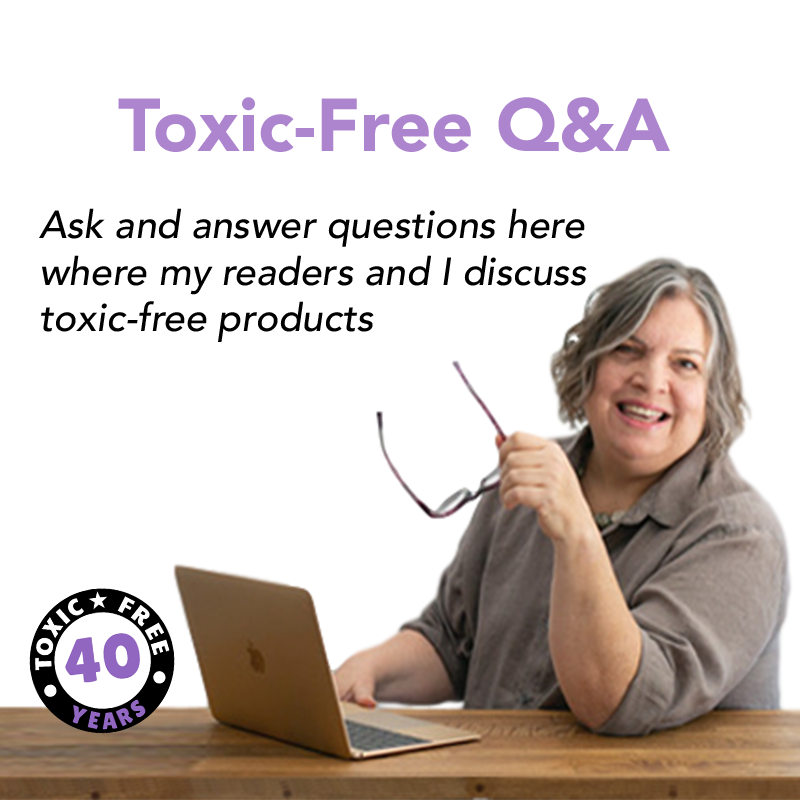
Submitted questions will be posted with my response by the following Tuesday or before.
Submitted comments will be moderated and approved within 24 hours.
Removing Perc from previously dry cleaned clothes
Question from cold canary in the coal
My “new” used coat came to me with a strong toxic chemical smell. It smells like a very sweet fragrance, but has a much more intense component to it than any other scented item I’ve had to deal with. The coat is a fake suede/sherpa made from polyester, I believe. The label says it’s dry clean only, so I suspect part of what I’m smelling is perc.
I had immediate symptoms from the exposure to the coat, which was similar to my reactions to toluene, which is common in fragrances, but there was a different quality to it. It seems to volatilize off the fabric with more noticeable particles, and felt stickier, like dryer sheets (but much stronger even). It impacted my brain similarly as well, but wasn’t as heavy as toluene, which makes me feel like there’s a heavy cold blanket pressing down on my brain. This made me feel more dizzy, lighter, but with the same weakness in my knees. I had shortness of breath for quite a while longer after a relatively much shorter exposure than with toluene, accompanied with nausea. The most dramatic difference was that the smell travelled through two layers of plastic trash bags, over a period of a few days, which the smell from clothes with toluene based fragrances doesn’t.
It might seem crazy even to suggest that this coat should not be immediately taken to a hazardous waste site, but I’m poor and cold, and because I’m chemically injured and severely sensitized, have tremendous difficulty finding clothes that don’t make me ill, so everything I wear has to be decontaminated first. I usually have to wash second hand clothes at least a dozen or two times in massive amounts of baking soda and borax and vinegar. New clothes also have to be washed repeatedly. And I simply can’t afford to buy organic clothes, which sometimes require just as much decontamination.
Sooooo, I wonder if there’s anything that works to get this horrible toxic substance out of the thick fabric of my coat? I’ve already taken it to a CO2 cleaner and they seem to have reduced it slightly. I’ve thought of hanging it out on the roof for a while, throw it in a dryer on cold air for a few hours, and dump it in more layers of plastic with a few pounds of baking soda and borax and leave it in there for a few weeks, shaking it occasionally. I’m not sure how safe it is to soak the coat in water, and am concerned about prolonged exposure, but have thought of hosing it down for a long period of time with a garden hose, then let it dry in place. Am I delusional in thinking that I will ever be able to wear this coat, or is there any chance I can get the perc out?
Debra’s Answer
I would suggest taking the coat to the hazardous waste site, however, I understand your predicament.
My understanding about perc is that it is a volatile organic chemical which will dissipate within a few days if left out to air. So I’m not sure whatever you are smelling is perc.
Readers, any suggestions?
Spilled Window Cleaner On Beige Rug
Question from elizabeth shipley
I spilled a little of a Windex kind of window cleaner on a beige rug about the size of a dime. I tried a mixture of 1 part white vinegar to 10 parts water. It’s still there. Any suggestions?
Thanks
elizabeth shipley
Debra’s Answer
I don’t know the answer to this, but manufacturers of products know how to remove their products from various surfaces and materials. You can always contact them.
Most energy efficient stereo?
Question from Mary
Hi Debra Lynn, and thanks for having this site.
I’m living in rural cabin, completely off grid w/ solar power — great in summer, iffy in winter. This winter I’ve had very little music or radio in my life, as I don’t have the power to run my old stereo, even when plugged into a power bar so I can shut it off when not using. Then the radio quit. So I got a used stereo that used low power (Magnovox) at Goodwill, but it only lasted a couple months before the CD player quit.
Well, I’m ready to do my part for the flailing economy. I plan to go out and buy a spanking new stereo (keeping old but good speakers, of course). I’m looking for the MOST energy efficient stereo available, that’s decent quality and will last a good long time. Can you please recommend one or two? I’m having no luck so far, the little boys running electronic stores look at me like I just landed from Mars.
And any tips for disposing of two crippled old stereos, electronic waste at this point?
thanks,
Mary
Debra’s Answer
Energy Star has addressed this question at Energy Star: Home Audio.
Clean House, Clean Planet
Question from Chiq
I have been looking very carefully into alternative household cleaning products and wanted to know if anyone has any feedback on the book Clean House, Clean Planet by Karen Logan. For example, do the ideas/products work effectively, is it really cost effective, etc. Any comments would be greatly appreciated.
thanks,
Chiq
Debra’s Answer
I personally don’t have a copy of this book and haven’t read it. Readers?
Pacifiers
Question from Kristen
Hello Debra and readers,
I have been shopping for a safe pacifier for months. According to my research, there are non that are safe. Many of the pacifier shilds are made of polycarbonate/plastic #7 or a combination of #7 and #5. Some silicon nipples even contain arsenic. Any suggestions?
Debra’s Answer
Moms, what do you suggest?
Shaklee Basic G
Question from goin’ green
Could you please tell me if there are any risks to humans or the environment with the product by Shaklee called “Basic G?”
According to the Material Safety Data Sheet, the hazardous ingredients are didecyl-dimethyammonium chloride, n-Alkyl (C14-50%, C12-40%, C16-10%) dimethyl benzyl ammonium chloride, ethanol, octyldimethyl amine oxide, ethylenediamine tetraacetic acid, sodium hydroxide)
This product comes in a concentrate. To use, 3/4 tsp. is used per quart of water.
I am planning to use this only for surfaces contaminated with raw meat or in bathrooms. It will replace the product, 409 in my home as I am under the impression that Basic G is a safe alternative. Do you have other suggestions for a safe (for humans and the environment) product that could be used for the previously mentioned applications? Thanks
Debra’s Answer
The law requires that companies list substances on the MSDS sheet as hazardous ingredients because they are hazardous. Yes, hazardous to humans and the environment.
I don’t have time today to look up all these chemicals and write out their health effects. But you can type each one into your favorite search engine and find out how they are hazardous to health.
In my kitchen, I cut meat on a cutting board that is used only for that purpose, then I put it in the sink and scrub it with hot hot water and soap, and let it air dry on the dish rack. I’ve had no problems with contamination.
In the bathroom, vinegar or hydrogen peroxide will kill germs, also hot water, or a steam machine.
Readers, any other suggestions?
Long Underwear
Question from Laura
Debra, you commented on wanting long underwear in cotton — presumably because it is more eco-friendly than synthetics? but you must remember that conventional cotton probably does as much ecological damage as most synthetics. I actually have some wonderful polyester long underwear (cuddleduds) which has lasted about 15 years and is very warm, doesn’t cling under my clothes, and although certainly NOT made from recycled pop bottles at the time I purchased it, I can state that its longevity and durability have certainly helped minimize its carbon footprint. I wonder if anyone is producing long johns out of recycled polyester fibers?
Laura
Debra’s Answer
Actually, I wear cotton because it is more comfortable against my skin, and it’s a renewable resource. I’ve already discussed wearing non-organic cotton at Q&A: Conventional vs organic cotton clothing.
True, synthetics last longer, but I just can’t wear them. And they last too long–they don’t biodegrade.
Berkey water filter
Question from Leah
Does anyone own one of these or know anything about them? I am considering purchasing one. The information on their website is impressive, but I am afraid I may be missing something. It looks like it removes most impurities, without removing minerals and they even have a special filter for removing fluoride.
The website is http://www.berkeywater.com.
Thank you!
Debra’s Answer
Hmmmm…interesting. This is a free-standing unit that you pour water into, with a large filter. I would get the stainless steel rather than the plastic unit.
Readers, any experience with this?
Acrylic Plastic Tumblers
Question from Heidi B.
would you have any information on acrylic plastic dinnerware? we bought some really fun tumblers from costco but when we got them home and realized what an impulsive move we made. we don’t know anything about acrylic plastic and we avoid plastics especially with food…the colors were just so fun ; ) unless they are somehow safe, and we doubt that, they are going back.
thank you!
Debra’s Answer
Acrylic is made from acrylonitrile, a special group of vinyl compounds. In my book Home Safe Home I noted that acrylonitrile is included on the Environmental Protection Agency’s list of sixty-five “priority pollutants” recognized as being hazardous to human health. Scorecard: Chemical Profiles: Acrylonitrile notes that it is a carcinogen.
Take them back, please…
MCS And Hospital Stays
Question from laura kasisky
I was diagnosed with mcs 6 years ago. How do others deal with hospital stays and hospital procedures. My family has a history of heart problems. I’d like to be prepared in case this situation should arise. The only doctor who is sympathetic to my needs is 2 hours away. I’m not that comfortable with the local doctor that I see.
Debra’s Answer
Readers?







